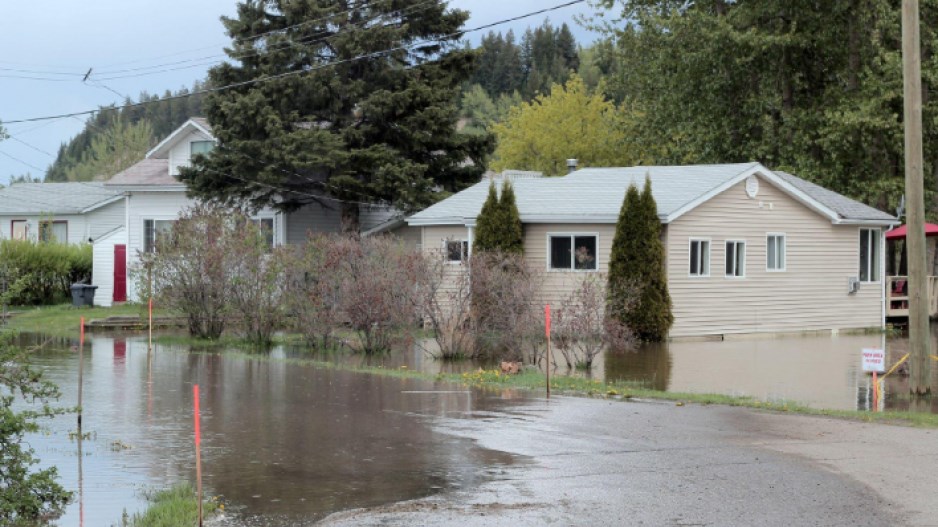The adverse effects of climate change are being increasingly felt throughout the province with events like heat domes and forest fires, and these can all have an impact on real estate. As B.C. moves out of the summer months and into the rainy weather that characterizes the province, homeowners should keep in mind the effect that climate events can have on real estate.
A study from the Intact Centre on Climate Adaptation (ICCA) shows that climate events, specifically flooding, can decrease the price of a home by 8.2 per cent. In addition, a home is on the market for 22 per cent longer than one being sold in a region that has not been impacted from flooding. On average, communities that are prone to flooding as a result of climate change see 44.3 per cent fewer listings.
Kathryn Bakos, ICCA’s director of climate finance and science, said that results of the study also show that while there is no impact on a homeowners ability to pay their mortgage, there was a reduction in the appraised value of a home due to flooding. This in turn impacts the loan to ratio value of a property.
“If the value of the mortgage property is compromised by unanticipated flood risks then issuers and lenders may be erroneously approving or miss pricing mortgage rates,” Bakos said.
Findings note that floodplains are expanding as a result of more extreme precipitation events which puts more Canadians at risk.
The study’s aim was to determine if community level flooding affects Canadian residential real estate in detached, semi detached and row housing. Data was not collected for not apartment buildings or commercial real estate.
According to the study’s media release, the impact of flooding was measured for periods of six months before and after flood events. The impact of these floods were determined by comparing changes in nearby non-flooded control communities over identical time frames.
On average, the median time to sell a home is roughly 65 days. If that home is in a community with a flood risk, it will stay on the market for an additional 13 days, according to the study. Bakos says that this can be attributed to more caution on the part of the buyer as well as the home needing more time for the stigma of the flood to pass.
Bakos says that the average cost of a basement flood is $40,000.
“If you're at risk of flooding, and you don't have disposable income, that's then where mortgage arrears and deferrals could come into play and people could start defaulting on their mortgages,” she said.
For those that want to educate themselves about the floodplains in their area, Bakos says that flood maps can be a useful tool. However, many of these are 20 to 25 years old and not an accurate representation of risks. The hope, Bakos says, is that they will be updated in the coming years.
In the meantime, she encourages residents of areas that are at risk for flooding to maintain what you already have at least twice a year. This can be as simple as removing debris from the nearest storm drain and cleaning out eavestroughs. In addition, she recommends that homeowners look into any upgrades that can be made around the house.
For many British Columbians, flooding is seen as more of a risk after the November 2021 floods that hit the Fraser Valley region.
According to Sandra Benz, president of the Fraser Valley Real Estate Board, many residents were lucky as the floods hit mainly agricultural areas of the region.
“We didn't really see a specific impact on the housing market that surrounded it, except for access for a while. So there were certainly some challenges that took us time just like the entire province to get over,” she said.
However, Benz did note the need to update flood mapping to allow home buyers the ability to make an education decision. She said that buyers should rely on the knowledge of their realtor and encourages conversations around climate events with real estate professionals.
“We encourage people to use the services of a local professional, because they are going to be able to guide you and advise you in the things that may in fact impact you in the neighborhood you're looking at, regardless of where that is,” she said.
“That could be anything from developments in the area that you weren’t aware are happening to making sure you've got the exact right kind of flood insurance because there are different types.”
Tim Hill, a realtor from RE/MAX All Points Realty in Vancouver, says that following the floods in 2021, a common question he gets when listing that area is if the home he is selling was affected by the floods.
“That came up a lot and so I do think [climate events] would have a negative connotation on home value,” he said.
“When you think about the resale value in the long term, whenever there is something negative about a property, that negativity will generally stay with it.”
In addition, Hill says that he’s heard “through the grapevine” that home insurance in the Okanagan, a region prone to forest fires, can be extremely difficult to get.
“I've heard that within a certain proximity of live fires, insurers won't insure. So then your ability to actually transact and purchase that home goes down, which would hurt the market in my opinion.”




